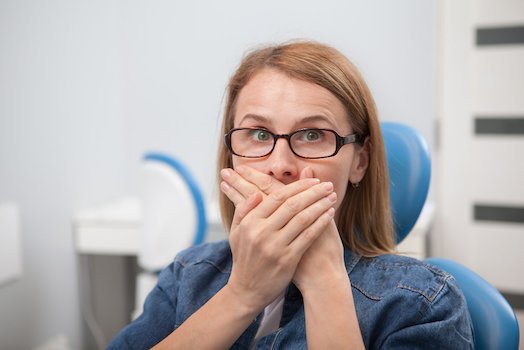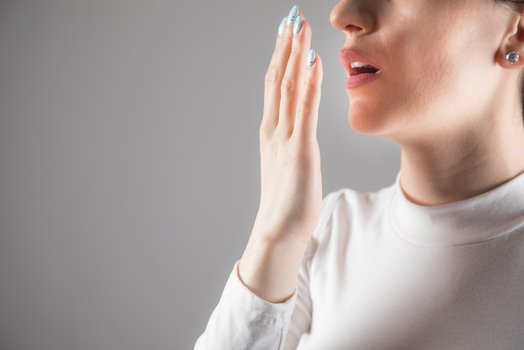Bad Breath Treatment
Bad Breath Causes, Treatments, and Prevention
Bad Breath Treatment Melbourne CBD
Bad breath is one of the several results of poor dental hygiene habits and can be a sign of an overall health threat.

At Art De Dente, we can help diagnose your bad breath and provide fast and practical treatment solutions.
The common causes of bad breath are:
- Poor oral hygiene
- Gum disease
- Tooth decay
- Food stuck in between teeth and around the tongue
- Strong-smelling foods and drinks
Bad Breath Treatment at Art De Dente
Avoid tooth decay and lower your risk of gum disease. Have a regular oral hygiene routine. Bad breath treatment depends on its cause and severity.
For causes linked to oral health, your Melbourne CBD dentist will work with you to help you better control your bad breath.
Dental solutions may include:
Mouthwash and toothpaste. If your bad breath is caused by bacteria build-up, your Melbourne CBD dentist may recommend you use an antibacterial mouthwash and toothpaste.
Treatment of dental disease. If you have gum disease, see your Melbourne CBD dentist right away. Gum diseases can cause gums recession, leaving deep pockets that fill with odour-causing bacteria.
Your Melbourne CBD dentist might also recommend replacing old restorations since they become breeding grounds for bacteria.

Bad Breath Prevention
- Keep your mouth ALWAYS clean. Brush your teeth thoroughly before bed and at least once at another time during the day.
- Floss your teeth once a day to remove food fragments lodged between your teeth and under your gums.
- Chew sugar-free gum boosts saliva production and stops you from developing a dry mouth that can lead to bad breath.
Importance of Regular Dental Check-ups
Routine dental check-ups are essential to prevent bad breath and maintain oral hygiene.
Here’s why they are crucial:
1. Early Detection of Dental Issues
Dental conditions like gum disease, oral infections, and tooth decay can all contribute to bad breath. During a dental check-up, your dentist can identify any signs of these issues before they progress and worsen. By addressing these problems promptly, you can prevent them from causing persistent bad breath.
2. Professional Dental Cleaning
Even with diligent brushing and flossing at home, it’s difficult to remove all plaque and tartar buildup from your teeth. Over time, this buildup can harbour bacteria that lead to bad breath. During a dental cleaning, a dental hygienist can thoroughly clean your teeth, removing plaque, tartar, and food debris from hard-to-reach areas. This helps eliminate the source of bad breath and promotes overall oral health.
3. Customised Treatment Plans
If your dentist identifies any underlying dental issues contributing to your bad breath, they can develop a personalised treatment plan to address them. This may involve cavity fillings, periodontal treatment for gum disease, or dental restorations to repair damaged teeth. By treating these issues effectively, you can eliminate the root cause of bad breath.
4. Oral Hygiene Guidance
You can get helpful advice from your Melbourne CBD dentist on practising good dental hygiene at home. This includes advice on effective brushing and flossing techniques, recommendations for oral care products such as toothpaste and mouthwash, and tips for maintaining a healthy diet that promotes good oral health. Following these recommendations can help prevent future instances of bad breath.
Bad Breath Treatment in Melbourne CBD
If dental problems cause bad breath, your Melbourne CBD dentist can start treating the causes with dental cleaning or scraping.
Call us on (03) 9642 8955 or request an appointment online.
We are located at Level 17, 190 Queen Street in Melbourne CBD.
Frequently Asked Questions
What causes bad breath?
Food particles trapped between teeth, improper dental hygiene, gum disease, dry mouth, smoking, medicines, and more are some of the primary contributors to bad breath.
How can I treat bad breath?
Maintain proper oral hygiene, sip on water throughout the day, stop smoking and talk to your Melbourne CBD dentist about using different medicines.
If your bad breath won’t seem to go away after doing these things, schedule an appointment with your Melbourne CBD dentist.
How can I avoid bad breath?
Keep up on oral hygiene for fresh breath. Do not skip your check-ups, and rinse with an antibacterial mouthwash.
Why is bad breath a concern?
Bad breath can be embarrassing and indicate underlying dental issues or poor oral hygiene. It can also affect social interactions and self-confidence.
When should I see a dentist about bad breath?
It is advisable to visit a dentist if bad breath continues despite good oral hygiene. They can identify any underlying dental problems contributing to bad breath and recommend appropriate treatment.
How often should I visit the dentist to address bad breath?
Regular dental examinations every six months are recommended for preventive care. However, if you’re experiencing persistent bad breath or suspect dental issues, promptly schedule an appointment with your dentist.
Can certain medical conditions cause bad breath?
Bad breath can result from various illnesses, including digestive issues, diabetes, sinus infections, and lung infections. A healthcare provider must be consulted to address any underlying medical conditions.
Is bad breath always a result of poor oral hygiene?
While poor dental hygiene is a common cause of bad breath, it’s not the only factor. Other factors such as diet, lifestyle habits (like smoking), dry mouth, and underlying dental or medical conditions can also contribute to bad breath.
How does diet affect bad breath?
Strong-smelling foods such as onions, garlic, and certain spices can temporarily cause bad breath. Additionally, sugary foods can promote bacterial growth in the mouth, leading to odour. Maintaining a balanced diet and staying hydrated can help mitigate the effects of diet on bad breath.
Can certain medicines cause bad breath?
Yes, some medicines can cause dry mouth as a side effect, leading to bad breath. Saliva is essential for cleaning the mouth of bacteria and food particles, and it is decreased when the mouth is dry. If you suspect medicine is causing your bad breath, consult your healthcare provider for possible solutions.
How can I determine the cause of my bad breath?
If you’re unsure about the cause of your bad breath, it’s best to consult a dentist or healthcare professional. They can thoroughly examine your medical history and identify any underlying factors contributing to it.
